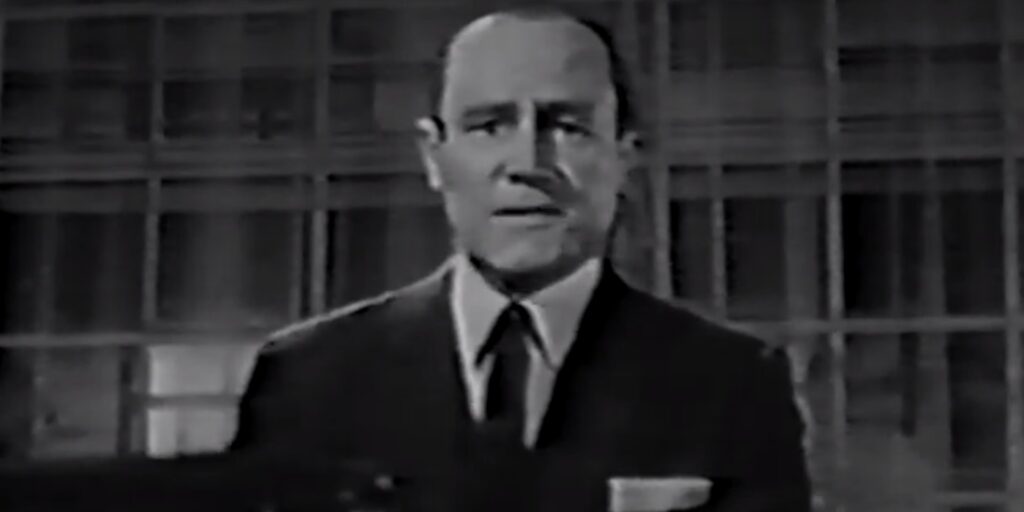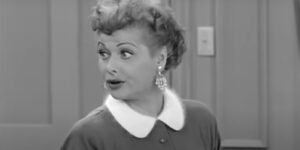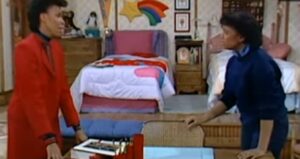
Today, we look at how a classic early The Defenders episode was essentially a plea against capital punishment directly to the audience.
This is “All the Best Things,” a spotlight on the best TV episodes, movies, albums, etc.
As you’ve no doubt noticed by now, I’ve mostly been going chronologically within the series that I’ve been spotlighting, but that’s mostly because I feel that it is important to establish the standard of every given show before then spotlighting an ATYPICAL great episode. That generally means going in chronological order, but in the case of The Defenders, I’m actually going to start with a Season 2 episode that is a bit more typical for the show before going back to an iconic (and controversial) Season 1 episode in the future.
The Defenders, like a lot of series of the era, began life as an episode of one of the great TV anthologies of the era (in this case, Studio One), which were basically collections of TV movies, but high end TV movies. The 1957 Studio One episode, “The Defender,” starred Ralph Bellamy and William Shatner as a father and son team of defense attorneys.
In 1961, the concept was revived for an ongoing TV series, The Defenders, with E.G. Marshall now playing the father character, Lawrence Preston, and Robert Reed playing the son, Kenneth Preston. Lawrence Preston was one of the most accomplished and respected defense attorneys in the country, and as a result of his long and storied history, now that he was an older man, he had the freedom to take on cases just because he felt that they needed to be taken on, without worrying so much about his career. His son loved the crusading aspect of his father, and ably helped his dad investigate and try these high profile, controversial cases.
Created by Reginald Rose, the show was a critical smash, and was clearly a very liberal show for the era. Heck, some of these plots are liberal for NOW.
A perfect example would be the classic Season 2 two-part episode, “The Madman,” written by Reginald Rose and Robert Thom (for Part 1, then Thom solo for Part 2, but obviously, Rose was still involved) and directed by Stuart Rosenberg. The episodes opened with a man, Joey Tassili (Don Gordon), who murdered a waitress. The issue at hand is that Joey is clearly insane. However, at the time, in New York, the rule of law for insanity was known as The M’Naughten rule. The rule states that for a criminal to be considered legally sane, they had to: 1. understand the nature and quality of his or her act and 2. had to be able to distinguish between right and wrong.
The issue, of course, is that a clearly insane person who is compelled to kill can still be dubbed legally sane under those requirements. Joey Tassili is a paranoid schizophrenic, but he knew that killing was wrong, so he was legally sane.
The Prestons, of course, think that that was absurd, and so for the first 60% or so of the two-part episode, they essentially put the rule on trial in court (Preston cuts a deal with the district attorney, who is sympathetic to Preston’s position. He allows Preston to go after the rule itself, while conceding that his client DID kill the woman). They interview Joey’s first girlfriend, who he assaulted (played by a young Doris Roberts), and she explains that Joey didn’t know what he was doing.
The key witness, though, is Joey’s abusive mother (played by Sylvia Sidney, appearing a year after her excellent turn in The Naked City episode that I spotlighted a couple of weeks ago, “A Hole in the City”), who establishes the abuses Joey suffered through as a child. The dude clearly isn’t all there. However, according to the current rules, he is legally sane.
In the 1970s, a new insanity rule was adopted by a number of states, including New York, which required that a defendant could not be convicted of murder if they could not:
1 Appreciate the criminality of their conduct; or
2. Conform their conduct to the requirements of the law
A number of states adopted this approach, but then John Hinckley was found not guilty by reason of insanity for trying to kill President Ronald Reagan, and people did NOT like that, so many states (as well as the federal government) went back to The M’Naughten rule, under which Hinckley likely would have been found guilty. New York, though, still uses the modern rule (although in New York, the burden is on the defendant to prove that they were insane. The most liberal rule, used by Massachusetts among some other states, is that the State has the burden of proving that the defendant IS sane).
Okay, so Preston’s gambit obviously fails, as the judge explains that this is the law, and there’s nothing he can do about it, and Joey is convicted and sentenced to death, and now the episode just becomes Rose/Thom railing away at capitol punishment.
Preston talks to an unseen governor asking for clemency, and really, Preston/Marshall is talking directly to the audience, pleading for them to stop killing prisoners. Obviously, eventually New York DID stop capitol punishment, but a number of states still kill convicted prisoners. So The Defenders‘ lessons are as powerful today as they were over 60 years ago (is it a coincidence that New York’s last execution was soon after this episode? Probably, but it’s still interesting).
The episode netted guest star Emmy nominations for Gordon and Sidney, but they didn’t win. The episode won the Emmy for Best Writing and Best Directing, however (and The Defenders won its second straight Best Drama Series Emmy. It won the Best Drama Series Emmy three years in a row, only missing out on a fourth because of a moronic change to the Emmy’s where they eliminated most of the categories, including Best Drama/Best Comedy Series. The Defenders lost in the combined Best Program category to the four winners out of fifteen nominees, The Dick Van Dyke Show, a Barbra Streisand special, My Name is Barbra, a Leonard Bernstein Young People’s Concerts special about Sonatas, and a Hallmark Hall of Fame TV movie, The Magnificent Yankee).
Okay, if I’m going to have 343 more of these, I could use suggestions, so feel free to email me at brian@poprefs.com!









